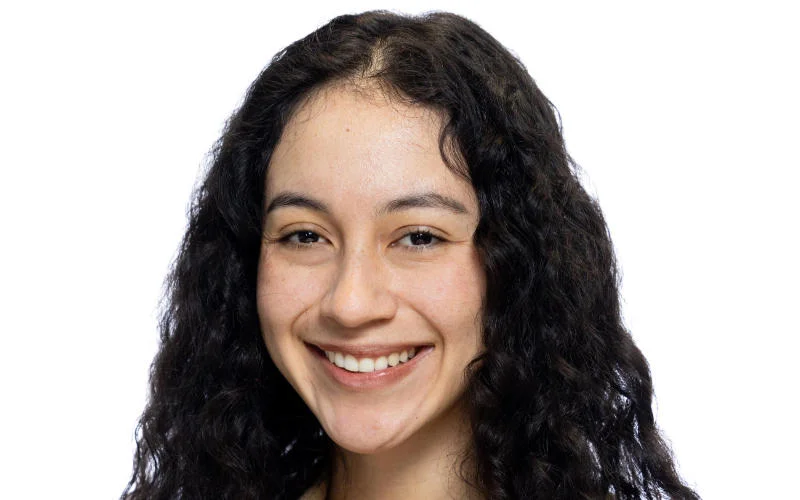Laura Unas Betancourt
MSc Social and Cultural Psychology
2024/25
Learn more about Laura's background and experience as an AKO scholarship holder in the Department of Psychological and Behavioural Science.

I have learned a lot about the richness of human variety, and I have started to think differently about my own context.
Hi Laura! Can you tell us a little about yourself and your background? Where are you from, and what were you doing before coming to LSE?
I was born and raised in Cali, Colombia, where I completed a double major in Political Science and Philosophy. After graduating, I worked as a research assistant at the Intercultural Studies Institute, mapping peacebuilding initiatives in Colombia for over three years before coming to LSE. There, I learned about the multiplicity of grassroots peace efforts taking place across my country, which deepened my fascination with social and cultural integration processes.
Choosing a programme is a big decision — what drew you to LSE and the MSc in Social and Cultural Psychology, and how did you know it was the right fit?
I have always been interested in understanding the interplay between individual behaviour and societal structures. While both of my undergraduate degrees provided tools to analyse the relationship between the micro and the macro, I wanted to further explore this relationship not as a dichotomy, but as an imbrication. That is how I discovered social psychology — a field that has truly satisfied my intellectual curiosity. When researching programmes, the MSc in Social and Cultural Psychology at LSE stood out, not only for its combination of both social and cultural psychology frameworks, but also because the programme director, Professor Sandra Jovchelovitch, has conducted research on social integration in Colombia. Hence, it felt natural to choose a place where the teaching staff had some familiarity with my own context.
As you reflect on your LSE journey, who or what had the greatest influence on your academic and personal growth?
I am very grateful for the effort many of my professors have made to bring contextual diversity into our classrooms. As we know, much of the published academic work in the social sciences has focused predominantly on WEIRD populations (Western, Educated, Industrialized, Rich, and Democratic), often overlooking the experiences of marginalised social groups. In this regard, I believe the teaching staff in my programme is particularly committed to addressing this epistemic injustice by encouraging us to apply our knowledge to our own contexts and by exposing us to research conducted across a wide range of cultural settings. As a result, I have learned a lot about the richness of human variety, and I have started to think differently about my own context.
Every journey has its hurdles — what were some of the challenges you encountered during your studies, and how did you grow through them?
Being an immigrant has been, by far, the greatest challenge I have encountered since I moved to London to study. I come from a place where nearly everything is different — the language, weather, social norms, educational system, etc. Navigating novelty while keeping up with the fast-paced rhythm of studying in London has been life-changing. Fortunately, early on, I focused on building a warm and supportive community, mostly made up of fellow LSE students, with whom I have formed warm and lasting friendships. I have also drawn on my intellectual curiosity to channel my personal struggles. For example, my experience as a Latin American immigrant in the UK inspired my dissertation on the identity processes of the Latin American community in London. Through this work, I have learned about grassroots organisations and initiatives that have motivated me to contribute to my region’s development. Finally, the need to articulate my frustrations led me to create a newsletter for my friends back home, which has become a creative outlet to process my experiences and a sweet way to stay connected with my community in Colombia.
How has your time in the PBS department, along with the AKO scholarship, equipped you to make a meaningful impact back home?
My time in the PBS department, generously sponsored by the AKO Foundation, has been deeply insightful. Specifically, it has revealed how often knowledge produced in Latin America is overlooked in mainstream academic circuits. Despite the limitations imposed by resource scarcity, I believe research in our countries is both impactful and innovative. Therefore, my experience here has led me to better appreciate the knowledge production practices taking place in my own context and has inspired me to advocate for its visibility and transference through more equitable epistemic relationships.
What insights or tips would you share with incoming AKO Master’s Scholars as they begin their own LSE journey?
Believe in yourself. I know it is a cliché, but for a reason. Most of the challenges that you will face when coming to LSE will be encountered outside the classroom. Applying for the scholarship is already a big leap of faith! But you will be here for a reason, so trust yourself, be brave and also gentle with yourself. Second — and I cannot stress this enough — invest in your relationships. Take the time to get to know people, be open-minded toward those different from you and learn how to be comfortable reaching out to strangers. Building a meaningful network will benefit you professionally and, most importantly, personally, so do not miss out the opportunity to meet new people and learn from them! Third, prepare well before your arrival. Learn as much as you can about the opportunities and resources LSE offers, so you can make the most of your experience during your studies. And last but not least: enjoy!
What three words best capture the essence of your year in the Department of Psychological and Behavioural Science?
Challenging, exciting, transformative.
.